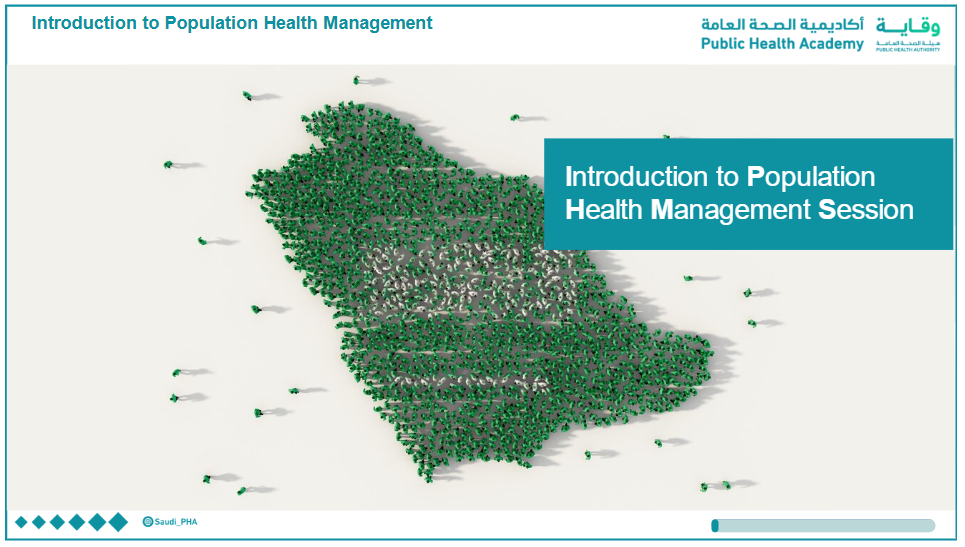الدورات المتاحة
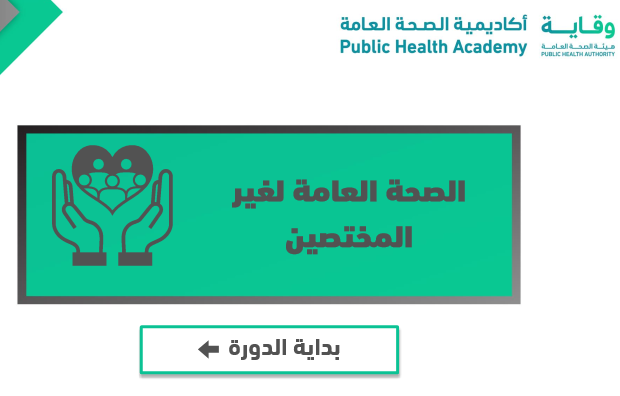
الصحة العامة لغير المختصين
الغرض
تمكين غير المختصين من تكوين فهم أساسي وشامل لمجال الصحة العامة، ودوره في تحسين صحة المجتمع والوقاية من الأمراض، بما يعزّز الوعي الصحي ويساعد على استيعاب المفاهيم والمصطلحات المرتبطة به.
الهدف العام
أن يكون المتدرب قادراً على استيعاب مفهوم الصحة العامة، والتمييز بينها وبين الرعاية الصحية، وفهم أبرز المصطلحات المستخدمة في هذا المجال، والتعرّف على التخصصات المختلفة للصحة العامة بنهاية الدورة.
الأهداف التفصيلية
- التعرف على مفهوم الصحة العامة.
- التمييز بين الصحة العامة والرعاية الصحية.
- فهم أهم المصطلحات في مجال الصحة العامة.
- الإلمام بالتخصصات المختلفة في الصحة العامة.
الفئة المستهدفة
-
غير المختصين في المجال الصحي.
-
المهتمون بالتثقيف الصحي ورفع الوعي المجتمعي.
-
العاملون في القطاعات غير الصحية ذات العلاقة بالصحة العامة.

تعزيز الصحة والسلامة في المساكن الجماعية للعمال
الغرض
تعزيز مفاهيم الصحة والسلامة الشاملة في المساكن الجماعية للعمال، ورفع وعي المشرفين والمقيمين بأهمية توفير بيئة سكنية صحية وآمنة، بما ينعكس إيجابًا على صحة العاملين وإنتاجيتهم واستقرارهم.
الهدف العام
تمكين المشرفين والعاملين في المساكن الجماعية من تطبيق أفضل الممارسات والمعايير لضمان بيئة سكنية آمنة وصحية، والمساهمة في تحسين جودة الحياة لجميع القاطنين.
الأهداف التفصيلية
-
تعريف المشاركين بمفهوم الصحة الشاملة للعاملين وأركانها الأساسية.
-
توضيح المخاطر الشائعة في بيئة السكن الجماعي وسبل الوقاية منها.
-
تدريب المشاركين على تحسين البيئة السكنية ودعم نمط الحياة الصحي.
-
تعزيز السلوكيات الصحية مثل: النظافة الشخصية، التغذية السليمة، النشاط البدني، النوم الجيد، والصحة النفسية.
-
تزويد المشاركين بالأدوات والآليات اللازمة لتقييم الأنشطة الصحية في السكن الجماعي وقياس أثرها.
الفئة المستهدفة
-
المشرفون على المساكن الجماعية للعمال.
-
العاملون المقيمون في المساكن الجماعية.
المدارس المعززة للصحة
مستهدفات البرنامج التدريبي
الهدف العام: تهدف الدورة التدريبية لتزويد الكوادر الإدارية والتعليمية بالمعرفة والمهارات اللازمة لتطبيق المبادئ التوجيهية للدليل الإرشادي للمدارس المعززة للصحة.
أهداف ومخرجات البرنامج التدريبي:
- بنهاية البرنامج التدريبي، تمكين المتدربين القدرة على استيعاب المفاهيم والمحاور الرئيسية للدليل الإرشادي للمدارس المعززة للصحة.
- بنهاية البرنامج التدريبي، تمكين المتدربين من تطبيق المفاهيم والمحاور الرئيسية للدليل الإرشادي للمدارس المعززة للصحة في توفير البيئة والأدوات التي تساهم في تعزيز نمط الحياة الصحي.
- بحلول نهاية البرنامج التدريبي، تمكين المتدربين من تصميم برنامج مستدام لمدرسة معززة للصحة.
- بنهاية البرنامج التدريبي، تمكين المتدربين من تنفيذ التوصيات المعتمدة من الدليل الإرشادي للمدارس المعززة للصحة.
- بحلول نهاية البرنامج التدريبي، تطبيق خطة المراقبة والتقييم لمبادرات مستدامة تساهم في تعزيز نمط الحياة الصحي في المدارس.
الفئة المستهدفة
احتياجات التعلم أو الفجوات في المعرفة أو المواقف أو المهارات أو أداء الفئة المستهدفة:
الفئة المستهدفة لهذا البرنامج التدريبي هم الكوادر الإدارية والتعليمية والفنية في مدارس المملكة العربية السعودية. وقد تشمل بعض الفجوات المحتملة في معارفهم أو مواقفهم أو مهاراتهم أو أدائهم ما يلي:
- معرفة محدودة بالمبادئ التوجيهية لتعزيز نمط الحياة الصحي في المدارس.
- توسيع نطاق تطبيق الدليل الإرشادي للمدارس المعززة للصحة..
- معرفة محدودة بأحدث أبحاث تعزيز نمط الحياة الصحي في المدارس.
منهجية تقييم مخرجات الحقيبة التدريبية
لتقييم فعالية البرنامج التدريبي، سيُطلب من المتدربين إكمال استبيان ما قبل وبعد التدريب لتقييم معرفتهم وفهمهم للمبادئ التوجيهية. بالإضافة إلى ذلك، سيتم توفير نماذج التعليقات بعد كل جلسة لتقييم فعالية الجلسات الفردية. سيتم استخدام التعليقات الواردة لإجراء تحسينات على برنامج التدريب حسب الضرورة.
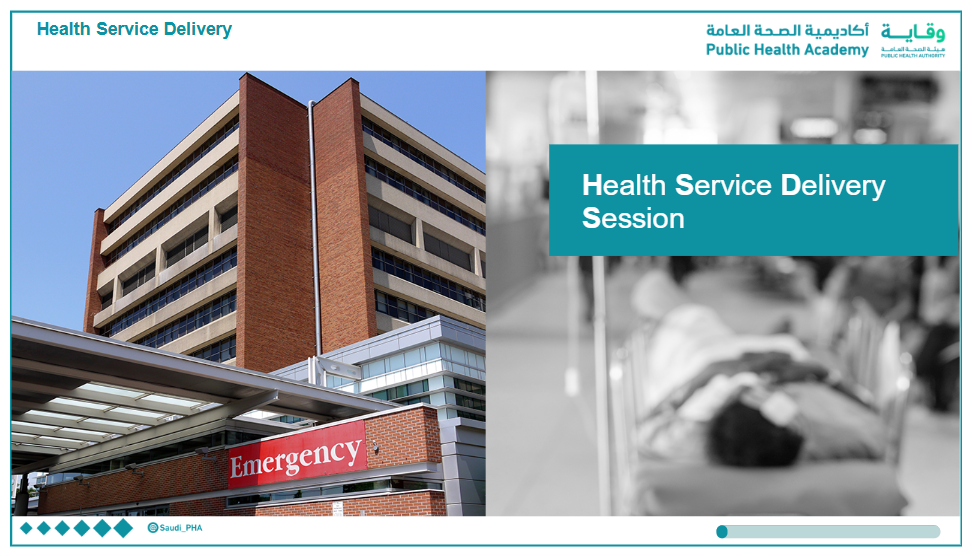
PHSSP
Public Health Support Skills Package
Public Health Support Skills Package
The Public Health Support Skills course is designed to empower participants with essential skills for effective leadership, management, and communication in public health settings. This comprehensive course integrates theoretical foundations, various leadership skills, and practical tools to support decision-making, program planning, resource management, and team development. By addressing key aspects such as health policy, stakeholder analysis, conflict resolution, and stress management, this course equips participants to navigate the complexities of public health systems and deliver impactful results.
Upon completion of this course, participants will be able to:
- Analyze health policies and adapt organizational strategies to improve service delivery.
- Apply organizational management theory in public health practice.
- Identify and apply various leadership styles and theories to influence and motivate teams in public health contexts.
- Develop and implement effective project management plans, ensuring optimal allocation and utilization of resources.
- Design evidence-based health programs that meet community needs and evaluate their effectiveness.
- Assess the roles and interests of stakeholders to foster collaboration and achieve program objectives.
- Implement change management strategies to enhance organizational performance and adaptability.
- Apply structured problem analysis techniques to identify challenges and craft actionable solutions.
- Foster a cohesive team environment and enhance interpersonal communication to achieve shared goals.
- Conduct self-assessments to identify personal strengths and areas for growth while resolving conflicts effectively.
11. Develop strategies to prioritize tasks, enhance productivity, and manage stress for personal and professional well-being.
· Public health leaders and managers,
· Public health practitioners.
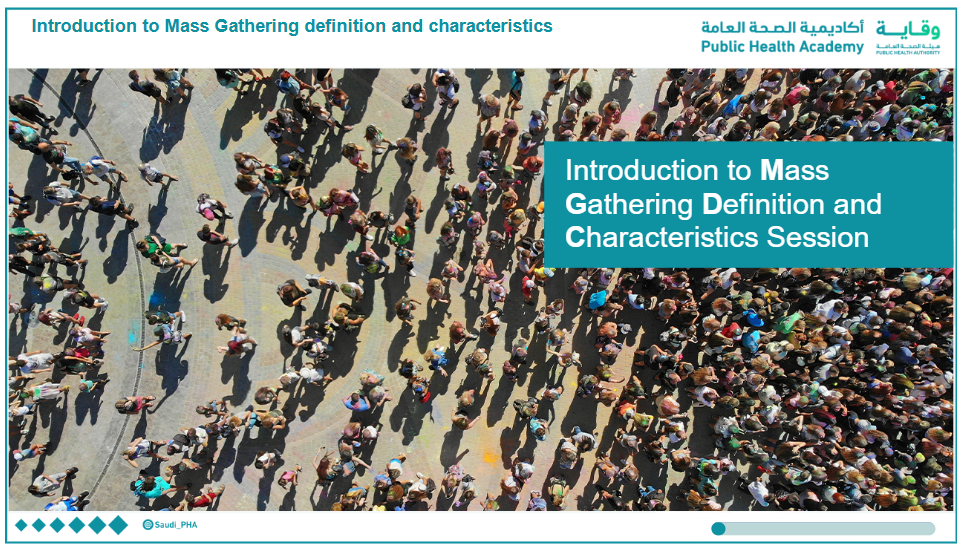
PHIMG
Public Health Interventions in Mass Gatherings
Public Health Management of Mass Gathering Events
Mass Gathering (MG) has been defined by the World Health Organization (WHO) as an occasion, either organized or spontaneous where the number of people attending is sufficient to strain the planning and response resources of the community, city, or nation hosting the event. Public health concerns which arise during such conditions include injury, communicable diseases, non-communicable diseases, exhaustion and heat-related illnesses among others. Public health workers aim to minimize these risks through gaining a better understanding of public health threats, strengthening of public health systems, and enabling of evidence-based decision-making. Furthermore, there is a demand to enhance preparedness, optimize surveillance, and develop rapid response capacities.
By the end of this session, the participants will be able to:
- Define mass gatherings and identify their unique characteristics and challenges on a global and regional level
- Identify the main public health concerns during mass gathering events
- Understand and apply the International Health Regulations (IHR) as they pertain to managing public health at mass gatherings.
- Describe the types and scope of mass gathering events in Saudi Arabia, particularly focusing on the Hajj and Umrah
- Conduct risk assessments for mass gatherings utilizing the right tools and prioritize needed health and safety interventions
- Identify the components of public health surveillance tailored to the specified needs and risks of different types of mass gathering events Grasp and apply various public health interventions specific for mass gathering
- Apply effective risk communication and community engagement strategies
- Implement environmental health and sanitation measures including addressing water safety, food hygiene, and waste management
- Collaborate effectively with various stakeholders, including healthcare providers, event organizers, and emergency services.
Professionals who have a role to plan and/or implement activities that aims to detect, prevent, and control public health events Mass Gatherings in Saudi Arabia. Preferable mid-level professionals and Rapid Responders
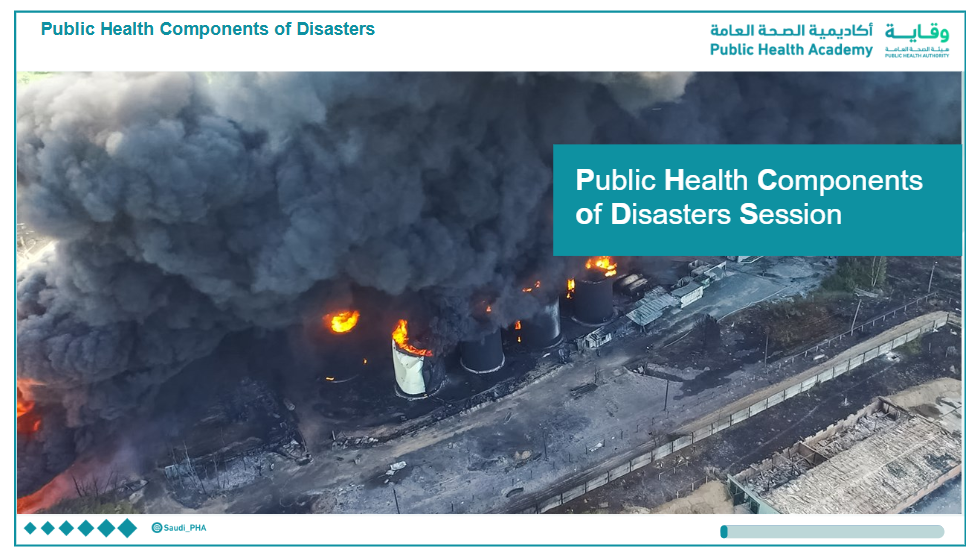
RMTTCC
Risk Management Tools and Techniques in Challenging Conditions
Risk Management Tools and Techniques in Challenging Conditions
Public health is impacted by a wide spectrum of physical, chemical, and biological hazards. People's health and lives become at risk when they interact with people and health system vulnerability factors. In order to minimize those risks, robust risk reduction measures need to be taken. However, risk reduction cannot be achieved without understanding the causes and influencing factors. Hence, risk assessment, including risk determinants, is crucial for any risk management plans and projects. This course provides field-oriented, locally adapted training that presents suitable tools and techniques to conduct risk assessments and develop risk management plans.
By the end of this session, the participants will be able to:
- Discuss the common public health risks in the region and globally
- Conduct effective risk assessments to determine potential impacts.
- Understand the process and approaches of hazard, vulnerability, and capacity assessment
- Utilize a range of tools and frameworks to manage risks effectively in uncertain environments.
- Demonstrate the development of risk reduction plans
- Develop and prioritize actionable strategies to reduce or control risks.
- Discuss the cost of risk management options.
- Communicate risk information clearly and effectively to various stakeholders.
- Effectively handle data in the acute phase of emergencies from collection to dissemination.
All public health professionals who are involved in assessing, planning, and implementing risk management interventions. The audience are those who execute the risk management functions as well as the manager of public health emergencies.
PHIE
Public Health Interventions in Emergencies
Public Health Interventions in Emergencies
Public health interventions differ greatly depending on the nature, scope and type of disaster, the availability of resources, and the social, political and economic characteristics of each affected community. Knowing common interventions and when to use them is critical for decision makers, public health professionals, humanitarian workers and disaster managers. This course follows the international guidelines and standards that are modified to meet the regional context and local characteristics of the Kingdom of Saudi Arabia. A large portion of this course will focus on surveillance, outbreak investigation and other cost-effective interventions with special approaches, techniques and tools that are adapted to suit emergency situations. This course integrates adult learning principles by incorporating case studies, real-life examples, questions, and interactive sessions wherever feasible.
By the end of this session, the participants will be able to:
- Identify the emergencies that face countries, particularly the Kingdom of Saudi Arabia.
- Identify the public health risks and consequences associated with emergencies
- Identify cost-effective interventions in responding to public health emergencies
- Understand the role of epidemiology in emergency management.
- Understand the type, structure and function of surveillance systems during emergencies.
- Conduct outbreak investigation in emergency situations.
- Conduct health needs assessments.
- Understand risk management
- Describe the key components of essential health services in emergencies and prioritize interventions to ensure accessible and continuous care for vulnerable populations.
- Make plans to keep primary and secondary care levels and referral services functioning during emergencies.
- Understand the logistics requirements of medical and humanitarian aid provision during emergencies.
- Explain the importance of Health Information Systems and their components.
- Identify essential WASH needs in emergency settings and outline effective interventions to prevent waterborne diseases and promote hygiene among affected populations.
- Explain the importance of mental health and psychosocial support in emergencies and identify appropriate interventions to address the psychological needs of affected individuals.
- Assess the impact of emergencies on food security and design basic nutrition programs to address malnutrition in affected communities.
- Develop effective health messages and utilize diverse communication channels to inform and educate affected populations on health risks and protective actions during emergencies.
Front Line Public Health Practitioners
الوقاية والسيطرة على حمى الضنك
الوقاية والسيطرة على حمى الضنك
تهدف الدورة إلى التعريف بطرق الوقاية من حمى الضنك من خلال الدمج بين التثقيف الصحي، والاستكشاف الحشري، والمكافحة الحشرية. يشمل البرنامج التعريف بمرض حمى الضنك وطرق انتقاله، وأعراضه، ودورة حياة الناقل، بالإضافة إلى استراتيجيات الاستكشاف والمكافحة المبنية على الإدارة المتكاملة لناقل المرض.
أهداف الدورة:
- شرح المفاهيم الأساسية لمرض حمى الضنك من حيث الأسباب وطرق الانتقال والأعراض، وطرق الوقاية.
- اتخاذ الإجراءات اللازمة في حال الاشتباه بحالات حمى الضنك على مستوى الأفراد والمجتمع.
- تمييز خصائص بعوضة الزاعجة المصرية (Aedes aegypti) ودورة حياتها وتحديد أماكن تكاثرها الشائعة.
- تنفيذ خطوات الاستكشاف الحشري الميداني والتعرف على أطوار البعوض الناقل باستخدام الأدوات المناسبة.
- تحديد وتطبيق طرق المكافحة الحشرية المختلفة للأطوار اليرقية والبالغة وفق استراتيجيات الإدارة المتكاملة.
Overview and Progress Update of Sexually Transmitted Infections (STIs) Globally and in Saudi Arabia
Course Description:
This course offers a comprehensive overview of sexually transmitted infections (STIs), focusing on global trends and the current situation in Saudi Arabia. It is designed for healthcare professionals, public health practitioners, and anyone interested in understanding the impact of STIs on public health.
Participants will explore the latest developments in STI prevention, treatment, and control, while gaining valuable insights into the epidemiological trends, challenges, and progress made in addressing STIs both globally and within Saudi Arabia.
Course Objectives:
By the end of this course, participants will be able to:
-
Understand the global epidemiology of STIs.
-
Analyze the current status of STIs in Saudi Arabia.
-
Recognize the key challenges in STI prevention, diagnosis, and treatment.
-
Identify progress and initiatives addressing STIs at the global and national levels.
-
Identify the Current Practices in STI Case Detection in Saudi Arabia.
Target Audience:
The course targets individuals interested in public health, healthcare practitioners, and anyone involved in the field of sexually transmitted infections.
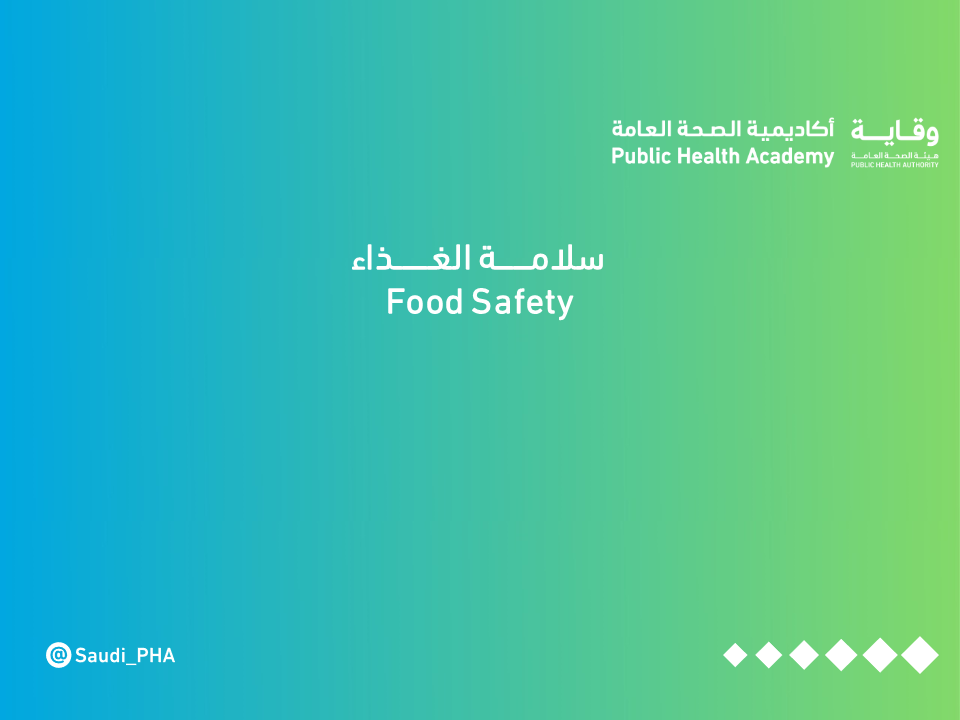
FS101
سلامــــــــة الغـــــــــذاء
الدورة التدريبية الخاصة بموسم الحج تتمحور حول سلامة الغذاء وتركّز على التوعية والإجراءات الأساسية لضمان تقديم طعام آمن وصحي خلال موسم الحج، خاصة في البيئات التي يكثر فيها التعامل مع الأغذية مثل مخيمات الحجاج والمطابخ المركزية.
وذلك لرفع مستوى الوعي والمعرفة لدى العاملين في مجال الأغذية خلال موسم الحج، وتعزيز ممارسات النظافة الشخصية وسلامة الغذاء لمنع التسمم الغذائي وحماية صحة الحجاج.
المحاور الرئيسية للدورة.
- مقدمة في سلامة الغذاء.
- علم الأحياء الدقيقة.
- مخاطر التلوث الغذائي.
- التسمم الغذائي.
- النظافة الشخصية للعاملين.
- تخزين الأغذية والتحكم بدرجة الحرارة.
- فساد وحفظ الأغذية.
- التنظيف والتطهير.
- مكافحة الآفات.
الفئة المستهدفة:
- العاملون في المطابخ والمطاعم الميدانية خلال موسم الحج.
- مشرفو السلامة الغذائية في الحملات.
- مقدمو الطعام في المخيمات.
- مسؤولو النظافة والصحة العامة.
Introduction to Public Health Laboratories (PHLs)
Course Description:
This course provides a comprehensive introduction to public health laboratories, highlighting their foundational components, operational systems, and critical contributions to public health. It is designed for new public health laboratory professionals, students, and anyone seeking a comprehensive understanding of public health laboratories.
Participants will gain insights into the historical evolution, core functions, and specialized roles of public health laboratories, including their impact on disease prevention, outbreak response, and policy development.
Course Objectives:
By the end of this course, participants will be able to:
- Understand the core components and systems of public health laboratories:
- Identify the multifaceted roles of public health laboratories:
- Analyze the importance of partnerships and collaboration:
- Examine advanced diagnostic technologies and data management processes:
- Understand the laboratory's role in global health security and emergency preparedness:
- Recognize ethical considerations in public health laboratory practices
Target Audience:
This course is aimed at new public health laboratory professionals, students, and anyone interested in gaining a comprehensive understanding of public health laboratories and their critical role in public health.تجاوز تصنيفات الدورات


